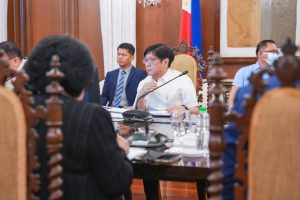Philippine President Ferdinand Marcos Jr. has defended his government’s decision to allow a larger U.S. military presence in the country, in the face of both Chinese and domestic political opposition.
In a speech that he delivered yesterday at an army ceremony, Marcos asked troops to prepare to face potential external threats after a half-century battle against communist insurgents that he said “is coming to an end,” Associated Press reported.
“The army must always be fully prepared and capable for any contingencies, especially considering you are the country’s last line of defense against any external security threat,” he said.
In February, Manila agreed to allow the U.S. military access to four additional Philippine military bases under the 2014 Enhanced Defense Cooperation Agreement (EDCA). The agreement allows the U.S. rotational access to a select number of military facilities – originally five – nominated by the Philippine government. EDCA allows the U.S. military to rotate troops through select Philippine military facilities, and to use facilities such as runways, fuel storage, and military housing.
Speaking to reporters after the speech, Marcos said that the closer security ties with the U.S. were vital for defending the country’s sovereignty. The Philippine leader also repeated officials’ earlier remarks that the four new EDCA sites had been confirmed and would be announced soon. He said that they would include bases in the north and south of the country, as well as on the western island of Palawan, which faces onto the disputed South China Sea. “There are four extra sites scattered around the Philippines,” he said. “We’ll make a formal announcement.”
Since taking office in July, Marcos has presided over a rapid improvement in the U.S.-Philippines relationship, which has not only reversed but also exceeded the anti-American turn engineered by his predecessor Rodrigo Duterte. This has been accompanied by a willingness to take a more outspoken stand about assertive Chinese actions in disputed parts of the South China Sea, where Chinese coast guard and maritime militia vessels frequently “swarm” Philippine-claimed features.
The speed and range of the U.S.-Philippine rapprochement has prompted consternation in several quarters. The most obvious opponent is China, the main catalyst for the recent advances in the security ties between Washington and Manila.
Last week, the Chinese embassy in Manila last week issued a statement in which it warned the Philippines that granting U.S. forces access to more military facilities will drag the Philippines into “geopolitical strife” and “seriously harm Philippine national interests and endanger regional peace and stability.”
More interestingly, the push has also encountered domestic political opposition. Some officials, including Senator Imee Marcos, the sister of the president, and Manuel Mamba, the governor or Cagayan province – a rumored site of an EDCA facility – have expressed fears that the Philippines could become embroiled in a U.S.-China conflict over Taiwan.
Marcos told reporters yesterday that opposition to the U.S. military presence by some local Filipino officials had been overcome. “We explained to them why it was important that we have that and why it will actually be good for their province,” Marcos said. He said that those who objected had now come around “to support the idea of an EDCA site in their province.”
As Justin Baquisal noted in a recent article for Fulcrum, the domestic dissent – he was referring particularly to the criticisms of Sen. Imee Marcos – was a “powerful reminder of how much Manila’s political environment has changed in recent years.”
Baquisal put the concerns down to the growing Chinese economic presence in the Philippines, which has made some officials willing to sidestep territorial disputes. He also pointed the ambiguities in the Marcos administration’s messaging, which has failed to clarify whether and to what extent the EDCA expansion is aimed at turning the Philippines into “a lily pad for American troops’ forward posture in Asia.” This in turn reflects a a substantial divergence of U.S. and Philippine interests, which are split between the need to defend Taiwan, and a desire to safeguard the South China Sea from Chinese incursions in the South China Sea.
The article finished by pointing at the tensions within Marcos’ political coalition, which remains reliant on the Dutertes – President Duterte’s daughter Sara is his vice-president – who are more skeptical about the current pro-U.S. turn. This could “come back to haunt the U.S. after the next Filipino presidential race in 2028, where Sara Duterte will be the strongest contender.”

































